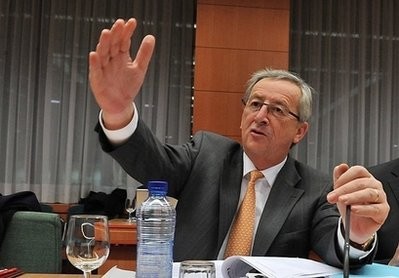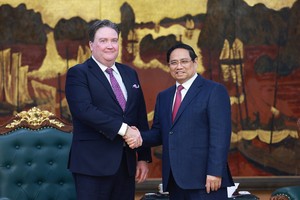Eurogroup head Jean-Claude Juncker called Germany's flat rejection of proposals for joint eurozone bonds "un-European" on Wednesday, prompting accusations from Berlin he was making markets uneasy.
IMF chief Dominique Strauss-Kahn also jumped into the fray, saying the situation in Europe remained troubling and that it faced posting very slow growth if it failed to pull itself together.
Juncker, who chairs meetings of eurozone finance ministers, told German weekly Die Zeit that Berlin had not even properly looked at his proposal, which was aimed at helping weaker eurozone members raise money.
"They are rejecting an idea before studying it ... This way of creating taboo areas in Europe and not dealing with others' ideas is a very un-European way of dealing with European matters," said Juncker, who is also Luxembourg's prime minister.

"It doesn't help anyone in Europe if European figures call each other un-European," responded Chancellor Angela Merkel's spokesman Steffen Seibert in a regular government briefing.
"It is exactly this talking against other people and about other people which should stop, because the markets definitely see this finger-pointing as a sign of disaccord."
Merkel herself urged "calm" ahead of next Friday's summit of EU leaders, where discussions will focus on creating a permanent crisis mechanism for the eurozone and what the chancellor called "narrow" changes to EU treaties.
"I think that we should work in a calm and goal-oriented manner towards what awaits us next Friday. This calm manner is my contribution to making sure we are successful next Friday," Merkel told reporters.
Such collective "E-bonds" could help eurozone members seen by investors as having shaky public finances lower their borrowing costs.
Sky-high interest rates for Irish and Greek bonds contributed to both countries having to seek outside help, and there are fears that other countries like Portugal and Spain might follow suit for the same reason.
But at a meeting of eurozone finance ministers this week, Germany was adamant that it thought Juncker's idea was not the way forward.
Germany has also put its foot down over increasing the size of the EU-IMF 750-billion-euro bailout fund.
Merkel has said joint eurozone bonds would lead to countries relaxing efforts to fixing their public finances, something she sees as key to preventing another crisis.
Germany fears too that joint eurozone bonds could push its own bond yields higher, and that eurozone bonds would contravene the European Union's governing treaties.
"In my opinion (eurozone bonds) do not create the right incentives ... and are not at all compatible with existing treaties," Merkel said.
"I don't think this discussion is taking us further. We need a constructive dialogue ahead of next Friday," Merkel said.
Andreas Rees, analyst at Unicredit bank, said that the prospect of E-bonds would all but bar countries like Spain and Portugal from being able to sell any national bonds.
Merkel's spokesman added that a "whole range" of other eurozone states were also opposed to the idea.
Speaking in Geneva, International Monetary Fund Managing Director Strauss-Kahn warned that the eurozone risked posting very slow growth.
"The situation in Europe remains troubling, and the future is more uncertain than ever," said Strauss-Kahn.
"I don't believe that the euro is in danger," he told a public forum organised by the United Nations.
"On the other hand, I think that if the eurozone does not pull itself together quickly enough, it would risk having periods of very slow, difficult growth, that it could avoid on condition that its governance is greatly improved."
























